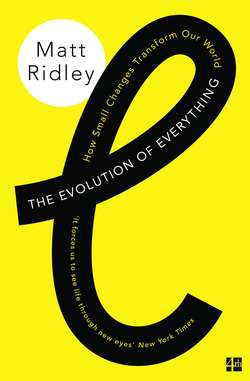Читать книгу The Evolution of Everything: How Small Changes Transform Our World - Matt Ridley, Matt Ridley - Страница 10
Pasta or worms?
ОглавлениеVoltaire was by no means the first poet or prose stylist to draw upon Lucretius, nor would he be the last. Thomas More tried to reconcile Lucretian pleasure with faith in Utopia. Montaigne quoted Lucretius frequently, and echoed him in saying ‘the world is but a perennial movement … all things in it are in constant motion’; he recommended that we ‘fall back into Epicurus’ infinity of atoms’. Britain’s Elizabethan and Jacobean poets, including Edmund Spenser, William Shakespeare, John Donne and Francis Bacon, all play with themes of explicit materialism and atomism that came either directly or indirectly from Lucretius. Ben Jonson heavily annotated his Dutch edition of Lucretius. Machiavelli copied out De Rerum Natura in his youth. Molière, Dryden and John Evelyn translated it; John Milton and Alexander Pope emulated, echoed and attempted to rebut it.
Thomas Jefferson, who collected five Latin versions of De Rerum Natura along with translations into three languages, declared himself an Epicurean, and perhaps deliberately echoed Lucretius in his phrase ‘the pursuit of happiness’. The poet and physician Erasmus Darwin, who helped inspire not just his evolutionary grandson but many of the Romantic poets too, wrote his epic, erotic, evolutionary, philosophical poems in conscious imitation of Lucretius. His last poem, The Temple of Nature, was intended as his version of De Rerum Natura.
The influence of this great Roman materialist culminates rather neatly in the moment when Mary Shelley had the idea for Frankenstein. She had her epiphany after listening to her husband Percy discuss with George, Lord Byron, the coming alive of ‘vermicelli’ that had been left to ferment, in experiments of ‘Dr Darwin’. Given that Shelley, Byron and Erasmus Darwin were all enthusiastic Lucretians, perhaps she misheard and, rather than debating the resurrection of pasta, they were actually quoting the passage in De Rerum Natura (and Darwin’s experimental imitation of it) where Lucretius discusses spontaneous generation of little worms in rotting vegetable matter – ‘vermiculos’. Here is the history of Western thought in a single incident: a Classical writer, rediscovered in the Renaissance, who inspired the Enlightenment and influenced the Romantic movement, then sparks the most famous Gothic novel, whose villain becomes a recurring star of modern cinema.
Lucretius haunted philosophers of the Enlightenment, daring free thinkers further down the path that leads away from creationist thinking. Pierre Bayle, in his Thoughts on the Comet of 1680, closely followed Lucretius’s Book 5 in suggesting that the power of religion derived from fear. Montesquieu channelled Lucretius in the very first sentence of The Spirit of the Laws (1748): ‘Laws in their most general signification, are the necessary relations arising from the nature of things’ (my emphasis). Denis Diderot in his Philosophical Thoughts echoed Lucretius to the effect that nature was devoid of purpose, the motto for his book being a line from De Rerum Natura: ‘Now we see out of the dark what is in the light’. Later, in The Letter on the Blind and the Deaf, Diderot suggested that God himself was a mere product of the senses, and went to jail for the heresy. The atheist philosopher Paul-Henri, baron d’Holbach, took Lucretian ideas to their ultimate extreme in his Le Système de la Nature of 1770. D’Holbach saw nothing but cause and effect, and matter in motion: ‘no necessity to have recourse to supernatural powers to account for the formation of things’.
One place where such scepticism began to take hold was in geology. James Hutton, a farmer from southern Scotland, in 1785 laid out a theory that the rocks beneath our feet were made by processes of erosion and uplift that are still at work today, and that no great Noachian flood was needed to explain seashells on mountaintops: ‘Hence we are led to conclude, that the greater part of our land, if not the whole, had been produced by operations natural to this globe.’ He glimpsed the vast depths of geological time, saying famously, ‘We find no vestige of a beginning – no prospect of an end.’ For this he was vilified as a blasphemer and an atheist. The leading Irish scientist Richard Kirwan even went as far as to hint that ideas like Hutton’s contributed to dangerous events like the French Revolution, remarking on how they had ‘proved too favourable to the structure of various systems of atheism or infidelity, as these have been in their turn to turbulence and immorality’.
